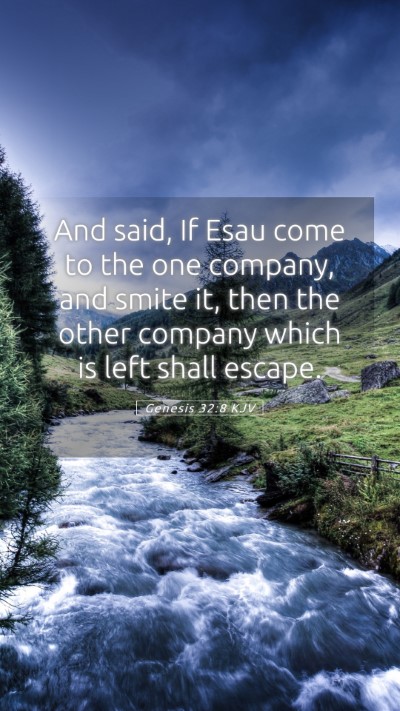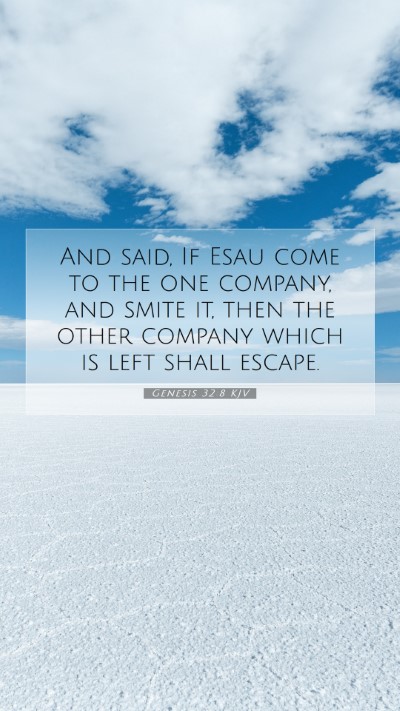Understanding Genesis 32:8 - A Comprehensive Commentary
Genesis 32:8 states, “And said, If Esau come to the one company, and smite it, then the other company which is left shall escape.”
This verse occurs during a pivotal moment in Jacob’s life as he prepares to meet his estranged brother Esau after many years apart.
To comprehend the significance of this verse, it is essential to explore its historical context, interpretative insights, and theological implications provided by noted public domain commentaries such as those by Matthew Henry, Albert Barnes, and Adam Clarke.
Historical Context
Jacob and Esau were twins born to Isaac and Rebekah, as detailed in Genesis 25. Their relationship was marked by competition and a struggle for their father Isaac's blessing. Jacob, having deceived Esau for his birthright, has lived for years in fear of Esau’s wrath. Now, as Jacob prepares to return to his homeland, he is anxious about facing the brother he wronged.
Commentary Insights
Matthew Henry's Commentary
Matthew Henry emphasizes Jacob's fear and humanity in this context. He reflects on Jacob's strategic planning, recognizing his vulnerability as he divides his family into two camps in hopes that at least one group might escape Esau's anger. Henry asserts this action exemplifies both prudence and faith, highlighting that Jacob's heart was heavy with the burden of his past actions.
Albert Barnes' Commentary
Albert Barnes notes that Jacob's division of his camp reflects his reliance on God and his acknowledgment of Esau's potential aggression. He suggests this strategy represents a blend of human caution and divine trust. Barnes points out that Jacob's words reveal his view of God's providence, preparing for the worst while still seeking God's favor for deliverance.
Adam Clarke's Commentary
Adam Clarke offers a more psychological perspective, touching on Jacob's fearfulness in light of his previous transgressions. He notes that Jacob's concern about Esau attacking is grounded in the reality of their fraught relationship. Clarke delves deeper into the emotional and spiritual turmoil Jacob faces, underscoring his deep-seated anxiety about not only the reunion but the well-being of his family.
Theological Implications
This verse encapsulates several theological themes central to the biblical narrative, including the struggle for identity, the power of reconciliation, and faith amidst fear. Jacob’s strategy can be seen as a metaphor for humanity's attempts to manage their circumstances while still seeking divine guidance.
Application in Daily Life
When applying Genesis 32:8 to contemporary life, it encourages believers to balance caution and faith in their own struggles. It prompts reflection on how past actions can influence present relationships and decisions. Believers can draw from Jacob's story to inspire courage in confronting their challenges.
Cross References
- Genesis 25:29-34 - The selling of the birthright.
- Genesis 27:1-40 - Jacob obtaining Isaac's blessing through deception.
- Genesis 33:1-16 - The eventual reconciliation between Jacob and Esau.
Concluding Thoughts
Genesis 32:8 is a profound verse that serves as a reflection of both personal conflict and divine providence. As viewers seek to understand Scripture, this passage provides insights into the complexities of human relationships and the ever-present need for reconciliation and faith in God's plans.
For those seeking further engagement with Scripture, considering Bible study resources or online Bible study can enhance their understanding. This verse can serve as a gateway for deeper reflection on the themes of sin, redemption, and divine intervention in human affairs.


